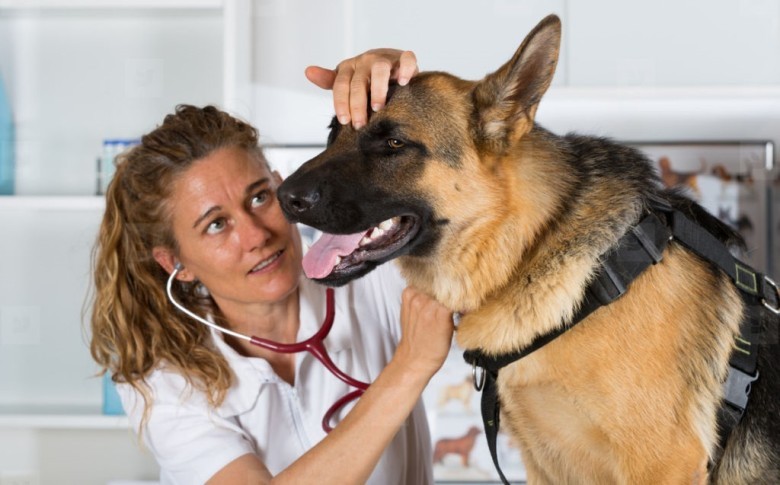
Keeping Your German Shepherd Healthy: Common Health Problems and Prevention

German Shepherds are one of the most popular dog breeds worldwide, known for their loyalty, intelligence, and versatility. Originally bred for herding and guarding, these dogs have become beloved family pets, police dogs, search-and-rescue animals, and service companions. However, like all breeds, German Shepherds are susceptible to specific health issues that every owner should be aware of. This article explores the common health problems associated with German Shepherds and provides insights on how to keep your furry friend healthy and happy.
Understanding Common Health Issues in German Shepherds
Hip and Elbow Dysplasia
One of the most prevalent health issues in German Shepherds is hip and elbow dysplasia. This genetic condition occurs when the joints do not develop properly, leading to arthritis, pain, and reduced mobility. The malformation usually appears in puppies, and over time, it can lead to severe discomfort and a decreased quality of life.
Symptoms:
- Limping or favoring one leg
- Difficulty getting up after resting
- Reluctance to engage in physical activities
- Pain or discomfort when touched
Prevention and Treatment:
While hip and elbow dysplasia is mostly genetic, there are steps that owners can take to mitigate the risk:
- Choose a reputable breeder who tests for these conditions.
- Maintain a healthy weight, as obesity can exacerbate joint problems.
- Provide a nutritious, balanced diet tailored to your dog’s age and activity level.
- Incorporate moderate exercise and weight management programs.
Treatment options can vary, including medication, physical therapy, weight management, and in severe cases, surgical intervention.

Degenerative Myelopathy
Degenerative Myelopathy (DM) is an inherited progressive disease that affects the spinal cord in dogs, leading to weakness and eventual paralysis of the hind legs. Symptoms usually appear in older dogs, making it particularly concerning for senior German Shepherds.
Symptoms:
- Weakness in the hind legs
- Difficulty walking, especially on slippery floors
- Dragging of the back feet
- Loss of coordination, leading to stumbling or falling
Prevention and Treatment:
While there is no known cure for DM, you can implement management strategies:
- Regular veterinary check-ups to monitor symptoms.
- Physical therapy and rehabilitation can help maintain mobility for as long as possible.
- Assistive devices, such as dog wheelchairs, can enhance mobility for dogs with advanced stages of the disease.
Exocrine Pancreatic Insufficiency (EPI)
Exocrine Pancreatic Insufficiency is a condition in which the pancreas does not produce enough digestive enzymes. This leads to poor nutrient absorption, weight loss, and diarrhea. German Shepherds are known to be prone to EPI, and early detection is essential for effective management.
Symptoms:
- Unexplained weight loss despite a normal or increased appetite
- Frequent, "cow patty" stools
- Flaky skin and poor coat quality
- Increased gas and bloating
Prevention and Treatment:
EPI is typically diagnosed through blood tests and requires lifelong management:
- A special diet, often high in fiber and low in fat, is crucial.
- Enzyme supplements can be administered to help with digestion.
- Regular veterinary check-ups will help monitor the condition.
Bloat (Gastric Dilatation-Volvulus)
Bloat, also known as Gastric Dilatation-Volvulus (GDV), is a potentially life-threatening condition that occurs when the stomach fills with gas and twists on itself. This can cut off blood flow to the stomach and require immediate medical intervention.
Symptoms:
- Swollen or distended abdomen
- Unsuccessful attempts to vomit
- Signs of pain, such as pacing, drooling, or restlessness
- Rapidly beating heart and signs of shock
Prevention and Treatment:
Preventative measures include:
- Feed smaller, more frequent meals instead of one or two large meals.
- Avoid vigorous exercise right before and after meals.
- Consider elevated feeding bowls, as they can reduce the risk of bloat in some dogs.
If bloat occurs, it is crucial to seek emergency veterinary care immediately. Treatment typically involves stabilizing the dog and performing surgery to untwist the stomach and prevent future occurrences.
Skin Conditions
German Shepherds can be prone to various skin conditions, including allergies, dermatitis, and infections. Allergies can stem from environmental factors, food, or parasites, leading to discomfort for your dog.
Symptoms:
- Itching or excessive scratching
- Red or inflamed skin
- Hot spots (localized areas of inflammation and infection)
- Hair loss or flaky skin
Prevention and Treatment:
To manage skin conditions effectively:
- Regular grooming helps remove dirt, parasites, and allergens from the coat.
- A balanced diet can minimize dietary-related allergies.
- Consult your veterinarian for allergy testing and appropriate interventions like medications or specialized shampoos.
Heart Problems
German Shepherds may experience heart problems, such as dilated cardiomyopathy, which affects the heart's ability to pump blood effectively. This condition can be inherited, so it’s essential to monitor heart health, particularly in older dogs.
Symptoms:
- Coughing or difficulty breathing
- Lethargy or reduced exercise tolerance
- Fainting or collapse
- Bloated abdomen
Prevention and Treatment:
- Regular veterinary check-ups can help catch heart disease early.
- A healthy lifestyle, including a balanced diet and ample exercise, is crucial for maintaining heart health.
- Medications to support heart function and additional treatments may be needed based on severity.
Obesity
Obesity is an increasingly common issue in German Shepherds, leading to various health problems, including joint issues, heart disease, and diabetes. Owners must be vigilant about their dog's weight through diet and exercise.
Symptoms:
- Excess body weight and lack of visible waistline
- Difficulty exercising or playing
- Excessive panting or lethargy
Prevention and Treatment:
Managing obesity involves:
- A prescribed diet, possibly from a veterinarian, that meets nutritional needs but reduces caloric intake.
- Regular exercise routines that include walks, playtime, and activities to burn calories.
- Limiting treats and monitoring food intake to maintain a healthy weight.
The Importance of Regular Veterinary Care

Regular veterinary care is vital for all dogs, but especially for breeds prone to genetic defects or health problems like German Shepherds. Veterinary visits should include:
- Annual Wellness Exams: Routine check-ups help identify health issues early.
- Vaccinations: Ensure your dog is up-to-date on essential vaccines, such as rabies and parvovirus.
- Dental Care: Regular dental cleanings are important to prevent periodontal disease, which is common in dogs.
- Parasite Prevention: Regular heartworm and flea/tick prevention reduces the risk of infections.
Proper Nutrition for a Healthy German Shepherd
Nutrition plays a crucial role in keeping your German Shepherd healthy. Here are a few tips:
- High-Quality Dog Food: Choose a premium dog food formulated for active breeds. Look for quality protein sources as the first ingredient.
- Age-Appropriate Diet: Puppies, adults, and senior dogs have different nutritional needs. Consult your vet about the best diet for your dog's age.
- Portion Control: Follow feeding guidelines and monitor your dog's weight to prevent obesity.
- Consultation on Supplements: If your dog has specific health issues, your vet may recommend supplements, such as omega-3 fatty acids for skin health or glucosamine for joints.
Exercise and Mental Stimulation

German Shepherds are active and intelligent dogs requiring regular physical and mental stimulation to thrive. Here are some recommendations:
- Daily Exercise: Aim for at least 1-2 hours of vigorous physical activity each day. This can include walks, runs, playtime in the yard, and structured activities like agility training.
- Mental Stimulation: Keep your dog mentally engaged with training sessions, puzzle toys, scent games, and interactive toys.
- Socialization: Regular interactions with other dogs and people can help reduce behavioral issues and promote confidence.
Grooming and Care
Maintaining your German Shepherd’s coat and overall hygiene is essential for their health. Some grooming tips include:
- Regular Brushing: Their double coat sheds significantly throughout the year, so regularly brushing can help control shedding and reduce mats.
- Bathing: Bathe your dog as needed, usually every few months or if they get particularly dirty. Use a dog-specific shampoo to avoid irritation.
- Nail Trimming: Regular nail trims are important to prevent painful cracking or splitting.
Recognizing Signs of Distress
Being vigilant about your German Shepherd's health involves observing for signs of distress or illness:
- Changes in Appetite or Weight: Sudden weight loss or gain can signal health problems.
- Behavioral Changes: Increased aggression, withdrawal, or unusual barking can indicate discomfort.
- Physical Symptoms: Vomiting, diarrhea, excessive panting, or lethargy are all reasons to seek veterinary care promptly.
Creating a Healthy Environment

Maintaining a healthy environment for your German Shepherd also contributes significantly to their overall well-being. Here are a few suggestions:
- Safe Living Spaces: Secure your home and yard to prevent accidents or escapes.
- Climate Control: Ensure your dog has access to cool areas during hot weather and warmth during cold snaps.
- Avoid Toxic Substances: Many common household items (such as certain plants, human foods, and cleaning products) can harm dogs. Keep these out of reach.
Conclusion
As a German Shepherd owner, understanding the common health issues your dog may face is crucial for ensuring their well-being. Regular veterinary care, a balanced diet, proper exercise, and mental stimulation create a strong foundation for a healthy, happy life. Being proactive about your dog’s health will enhance their quality of life and longevity.
By recognizing symptoms early and taking preventive measures, you can enjoy many years with your loyal companion while ensuring they lead a happy and healthy life. Embracing responsible pet ownership is key to nurturing a strong bond and ensuring your German Shepherd thrives in your care.




















Comments
0 comment